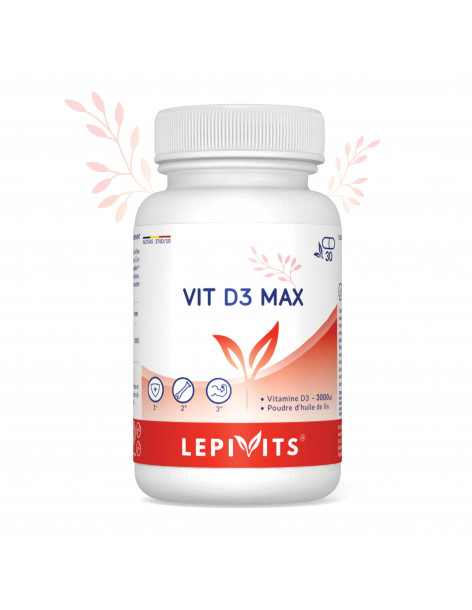Vitamins
They contribute to the assimilation of proteins, minerals and carbohydrates by our body. This is why a vitamin deficiency, due to insufficient intake in the diet in particular, can lead to internal body dysfunctions. However, an overdose of vitamins will not necessarily improve the performance of an already healthy body and can be toxic in the long term.
Most vitamins cannot be produced directly by the body. With the exception of vitamin D and vitamin K, which are not synthesised in sufficient quantities to meet our physiological needs anyway, we must obtain our multivitamins from the diet or from natural food supplements. Normally, a balanced diet of fruit, vegetables, proteins, lipids and carbohydrates is sufficient to cover the necessary intake recommended by ANSES, especially if accompanied by regular physical activity and sufficient exposure to natural light.
The problem is that we are not all equal in our sensitivity to nutrients. Some populations do not get enough sunlight, others suffer from pathologies that unbalance the composition of their body. Ageing, cardiovascular disease, diabetes and cancer all require vitamin supplementation.
Discover now the list of vitamins essential to the proper functioning of our body and their metabolic properties.
Essential vitamins
We know of 13 different families of vitamins, divided into two categories:
- Fat-soluble vitamins, which can dissolve in fat: these are the families of vitamins A, D, E and K. They have the capacity to accumulate rapidly, creating a risk of toxicity in the event of overdose. Vitamin A is stored in the liver, while vitamins D and E are stored in fatty tissue;
- Water-soluble vitamins, which can dissolve in water: these are the vitamins of the B and C groups. These can be stored, but are rarely accumulated in the body, as they are easily eliminated through the urine.
Vitamin A
Vitamin A is in the form of retinol, which is found mainly in animal foods. This vitamin is particularly well known for its antioxidant properties, i.e. it protects the body's cells from the effects of free radicals, released in particular by oxidative stress.
Vitamin A is involved in many metabolic functions, including visual health (adaptation of the eye to darkness) and bone growth, through the transcription of certain genes and the synthesis of other proteins. In addition, it keeps our skin and mucous membranes healthy through wound healing, protecting against viral and bacterial infections.
It is often associated with beta-carotene. Why is this? Beta-carotene is actually a form of provitamin A that is widely available in the diet, i.e. a plant carotenoid that is converted into vitamin A by the body.
Where can you find vitamin A? Mostly in offal, but also in vegetables such as sweet potatoes, carrots, squash and cabbage.
B vitamins
Each of the B vitamins has its own therapeutic indications, but overall they are involved in our main metabolic functions: protein and hormone synthesis, red blood cell production and oxygen transport, cell division, DNA and RNA synthesis, blood sugar regulation, immune system etc.
The B vitamin complex consists of 8 vitamins:
- B1 (thiamine) ;
- B2 (riboflavin) ;
- B3 (niacin);
- B5 (pantothenic acid);
- B6 (pyridoxine) ;
- B8 (biotin);
- B9 (folic acid or folate) ;
- B12 (cobalamin or cyanocobalamin).
Vitamins B6, B9 and B12 can work in coordination to enhance cognitive function and contribute to the proper functioning of the nervous system.
Where to find vitamin B? It all depends on its group. Vitamin B6 is found in seeds, oils and brewer's yeast, while vitamin B12 is only found in meat and fish (offal and seafood).
Vitamin C
Sensitive to water, air, heat and light, vitamin C is the most unstable of the vitamins. The vitamin C content of a food can disintegrate within a few hours and even faster depending on how it is stored or cooked.
However, this vitamin, also known as ascorbic acid, is involved in extremely important functions in the body. It promotes the absorption of iron, increases the body's natural defences against infection, protects the blood vessel walls and provides energy and vitality.
In addition to its antioxidant properties, vitamin C helps to strengthen teeth, bones and cartilage and accelerates healing.
Where can I find vitamin C? Mainly in acerola, red peppers, citrus fruits and cabbage, but also in strawberries and exotic fruits.
Vitamin D
It is well known that vitamin D is the best ally for our bone and dental health. It enables us to bind calcium and phosphorus from the blood to our bones and teeth, thus ensuring growth. But it also plays a role in the maturation of immune cells and in muscle contraction.
Where can we find vitamin D? In fish (salmon, red tuna, herring and sardines), animal milk, liver and vegetable drinks (rice and soya).
Vitamin E
With its antioxidant properties, this vitamin helps protect cells against oxidative stress.
Vitamin E protects the membrane surrounding the body's cells, especially red blood cells and skin cells, thus slowing down skin ageing.
Where to find vitamin E? Through food only: oils and oilseeds, cereals, avocado.
Vitamin K
Did you know that this vitamin takes its name from the German word "Koagulation"? Vitamin K is mainly involved in the blood clotting process. It is also involved in bone mineralisation and cell growth.
In fact, vitamin K exists in two forms: K1 (phytomenadione) and K2 (menaquinone). The former acts on coagulation, while the latter acts on tissue calcification.
Where to find vitamin K? Vitamin K1 is found in green vegetables (spinach, cabbage, asparagus), but vitamin K2 is produced by our body, thanks to the bacteria in our colon, and can be found in fermented foods (cheese, nori).



